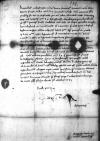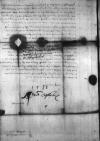Audio Reverendissimam Dominationem Vestram pro sacris in ⌊Ploczko⌋ ituram. Precor, ut felix faustumque sit iter et consecratio pro animae salute ad multos annos incrementoque rei publicae. Ad hortationem Reverendissimae Dominationis Vestrae dedi praesentibus commendaticias pro salvo conductu ad illustrissimum ⌊principem Prussiae⌋ condolens eorum casu, cum alioqui ipse iudex terrestris bene industrius et in multis causis tam a principe quam aliis opera eius usa est. Hesterno vesperi redditae mihi sunt litterae reverendissimi episcopi Premisliensis. Scribit, quod sacra ⌊maiestas regia⌋ dignata est ob virtutes et merita domini ⌊Ioannis a Werden⌋ in officio et dignitate burgrabiatus Gdanensis confirmare pro anno sequenti, quamvis non deerant, qui ambirent hoc munus [...] paper damaged⌈[...][...] paper damaged⌉. Ceterum serenissimi principes nostri Dei gratia bona fruuntur sanitate [...] paper damaged⌈[...][...] paper damaged⌉. Alias nil novi. Batavi multa minantur ⌊Lubicensibus⌋, sed ex [...] paper damaged⌈[...][...] paper damaged⌉ non auditur. Venerunt hac hebdomada duo vel tres naves ⌊Gdanum⌋ ex ⌊Anglia⌋ deferentes sal.
Item audivit proculdubio Reverendissima Dominatio Vestra, quae fama dispersa fuerat de dominis written over o⌈oisis written over o⌉ Gotcz, ⌊Fabiano Czema⌋ et Lanczkorunski, qui quosdam ⌊Italos⌋ ⌊reginalis maiestatis⌋ curienses debuissent occidisse. Quare dominus ⌊Achatius Czema⌋ etc. ad scrutandum ad fratrem misit ⌊Vilnam superinscribed⌈VilnamVilnam superinscribed⌉⌋ nihilque offendit veri esse, sed omnia ementita commenta. ⌊Reginalis maiestas⌋ indagari cupit auctorem huius famae, quando in ⌊Cracovia⌋ communis fama fuit et rescriptum in ⌊Vilnam⌋. His intellectis refocillati orig. revocillati⌈refocillatirefocillati orig. revocillati⌉ sumus.
Cum his me Reverendissimae Dominationi Vestrae unice commendo, quam felicissime semper in multos annos valere cupio.


 AAWO, AB, D. 67, f. 189v
AAWO, AB, D. 67, f. 189v